Achenbach System Of Empirically Based Assessment
Achenbach system of empirically based assessment. Kamphaus Reynolds 2007. The ASEBA is a comprehensive evidence-based assessment system developed through decades of research and practical experience. Starting with the ASEBAs origins in the 1960s it traces major milestones in the ASEBAs conceptual methodological and theoretical development.
Paroxysmal hand hematoma Achenbach Syndrome blue finger References This page was last edited on 18 August 2021 at 1351 UTC. The Achenbach System of Empirically Based Assessment ASEBA is de- signed to facilitate assessment intervention planning and outcome evalua tion among school mental health medical and social service practitioners. The ASEBA assesses competencies adaptive functioning personal strengths and behavioral emotional social and thought problems from age 1½ to 90 years.
ASEBA comprises questionnaires for reporting emotional and behavioral problems. Achenbach System of Empirically Based Assessment. For ages 1½ to 90 years developmentally appropriate forms are designed to be completed by collaterals who know the person who is being assessed.
The OABCL is part of a system of em-pirically based transdiagnostic dimensional instruments that span from early childhood through old age the Achenbach System of Empirically Based Assessment ASEBA. This study investigated the clinical utility of the Achenbach System of Empirically Based Assessment ASEBA for identifying youth at risk for suicide. The present study explored the ability of the school-aged Child Behavior Checklist CBCL and the Teachers Report Form TRF to screen for ASD in children and adolescents aged 6.
Text is available under the Creative Commons. ASEBA stands for Achenbach System of Empirically Based Assessment. The Achenbach System of Empirically Based Assessment ASEBA comprises instruments for assessing behavioral emotional social and thought problems and adaptive functioning.
The OABCL is intended for assessment of adults ages 60 and older. Furthermore the measure has demonstrated acceptable convergent validity with the Achenbach System of Empirically Based Assessment 71-77 Conners Rating Scales 51-78 Vineland Adaptive Behavior Scales 32-69 Childrens Depression Inventory 51 and the Revised Childrens Manifest Anxiety Scale 55. Achenbach System of Empirically Based Assessment ASEBA instruments obtain and compare reports and ratings from multiple informants to assess the behavioral emotional and social problems and adaptive functioning of people from age 1½ to 90 years.
The Achenbach System of Empirically Based Assessment ASEBA. Achenbach created the system because there were only 2 categories for childhood disorders at the time.
University of Vermont Department of Psychiatry2nd ed.
ASEBA comprises questionnaires for reporting emotional and behavioral problems. The present study explored the ability of the school-aged Child Behavior Checklist CBCL and the Teachers Report Form TRF to screen for ASD in children and adolescents aged 6. The Achenbach System of Empirically Based Assessment ASEBA comprises a family of forms for rating behavioralemotionalsocial problems and adaptive characteristics. It can be used in treatment. Children older than 11 years also completed the SDQ self-report and the Youth Self Report YSR. The Achenbach System of Empirically Based Assessment ASEBA is an instrument designed to provide standardized descriptions of behavioral functioning. The ASEBA is a comprehensive evidence-based assessment system developed through decades of research and practical experience. Starting with the ASEBAs origins in the 1960s it traces major milestones in the ASEBAs conceptual methodological and theoretical development. This book illuminates and integrates four decades of work related to the ASEBA.
Text is available under the Creative Commons. For ages 1½ to 90 years developmentally appropriate forms are designed to be completed by collaterals who know the person who is being assessed. Achenbach created the system because there were only 2 categories for childhood disorders at the time. Specifically we investigated how well the Total Problems scores and the sum of two suicide-related items 18 Deliberately harms self or attempts suicide and 91 Talks about killing self were able to distinguish youth with a. ASEBA comprises questionnaires for reporting emotional and behavioral problems. Approach was developed in the 1960s by Dr. The OABCL is intended for assessment of adults ages 60 and older.

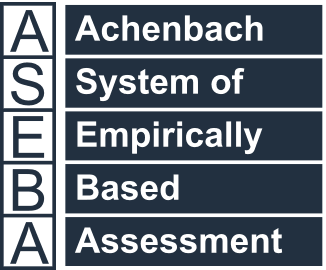










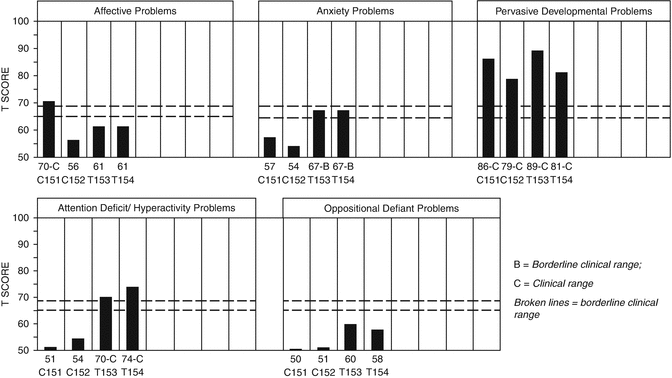



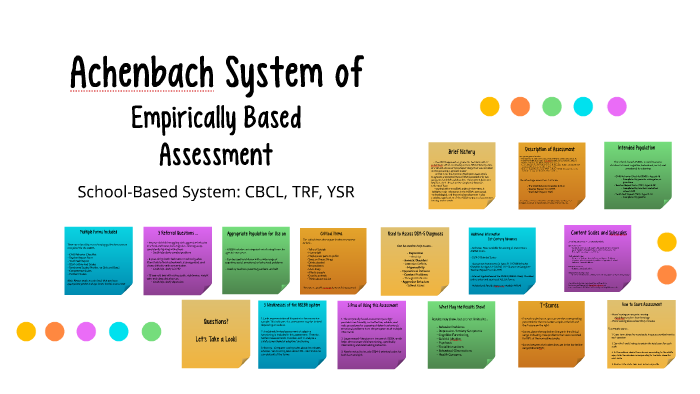





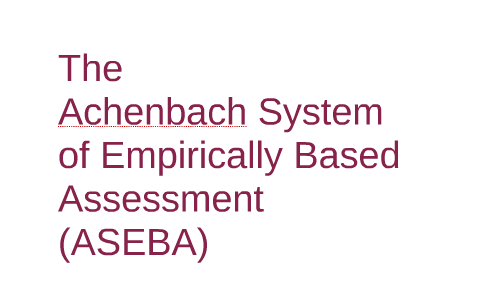




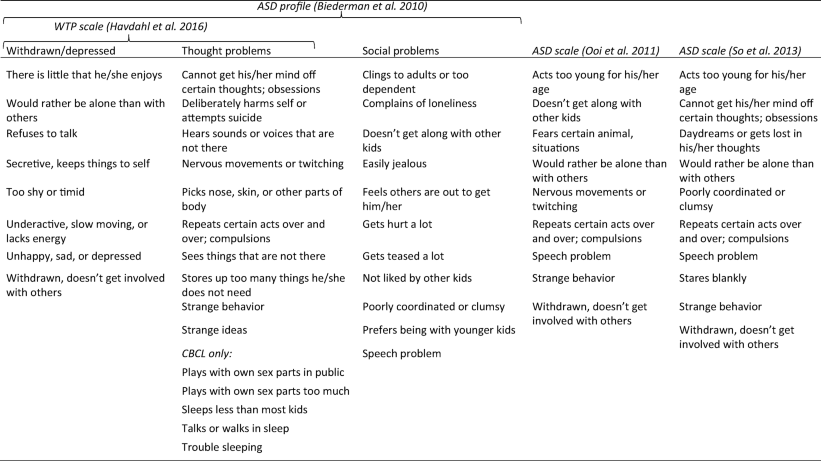
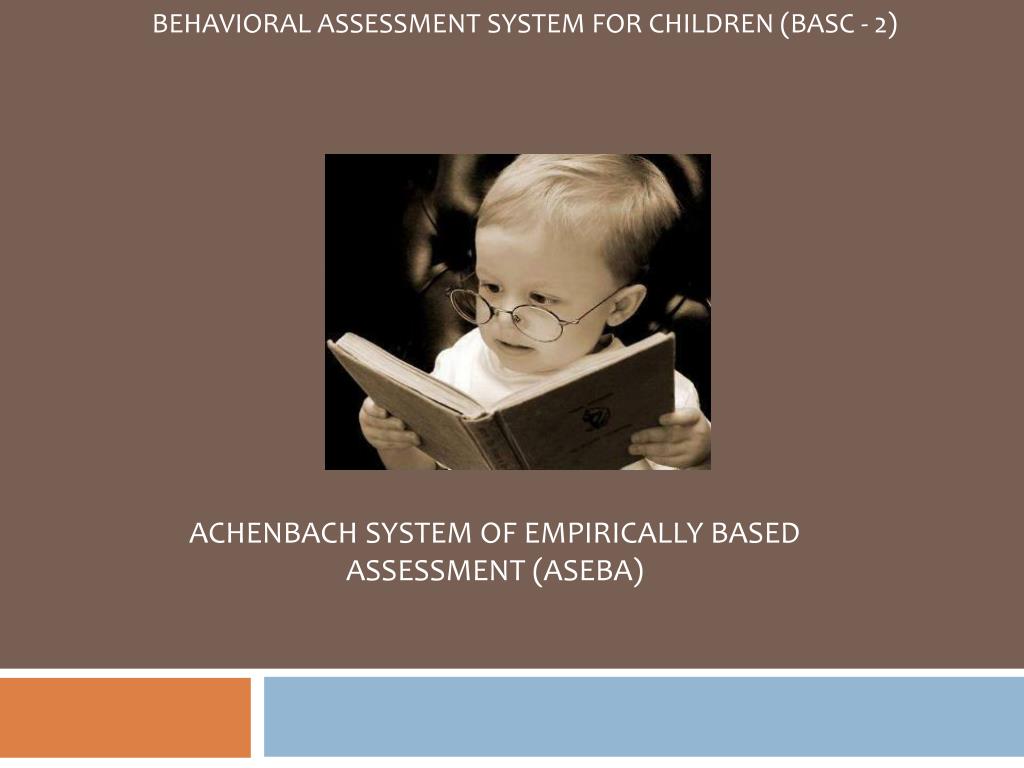





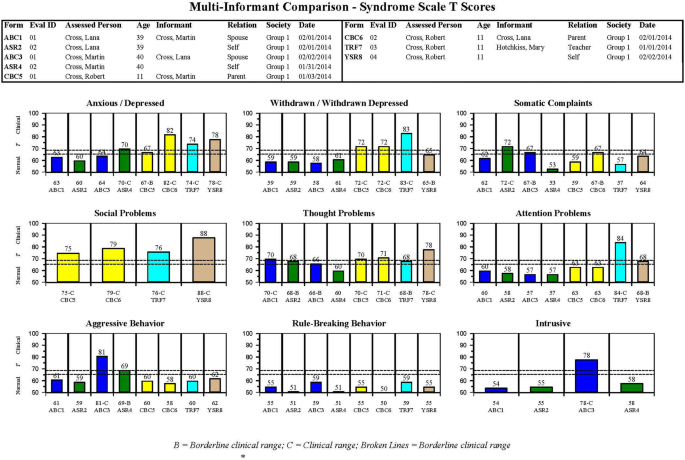





Post a Comment for "Achenbach System Of Empirically Based Assessment"